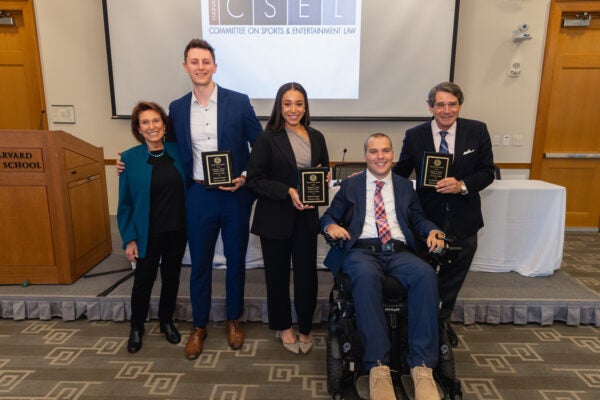During the Harvard Committee on Sports & Entertainment Law’s annual Harvard Sports Law Symposium, four students were celebrated for their contributions and dedication to the sports law community.
Ian Malesiewski ’25, Michael Poirier ’25, and Matisse Rogers ’25 received the Weiler Scholar Awards, and Alex Geyelin ’25 received the Weiler Writing Award. Each recipient has participated in a plethora of sports law courses, writing projects, and clinical placements at HLS.
Established in 2008, the Weiler Awards honor of Paul C. Weiler, Henry J. Friendly Professor of Law Emeritus at Harvard Law School, considered to be the founder of American sports law and one of America’s foremost labor law scholars. Weiler passed away in 2021 after a long illness; “Paul represented the best of our profession and of the legal academy,” said former Harvard Law School Dean John F. Manning ’85.
We caught up with the Weiler awardees to learn about their work in the Sports Law Clinic and how the Sports Law program has shaped their law school experience and future aspirations.
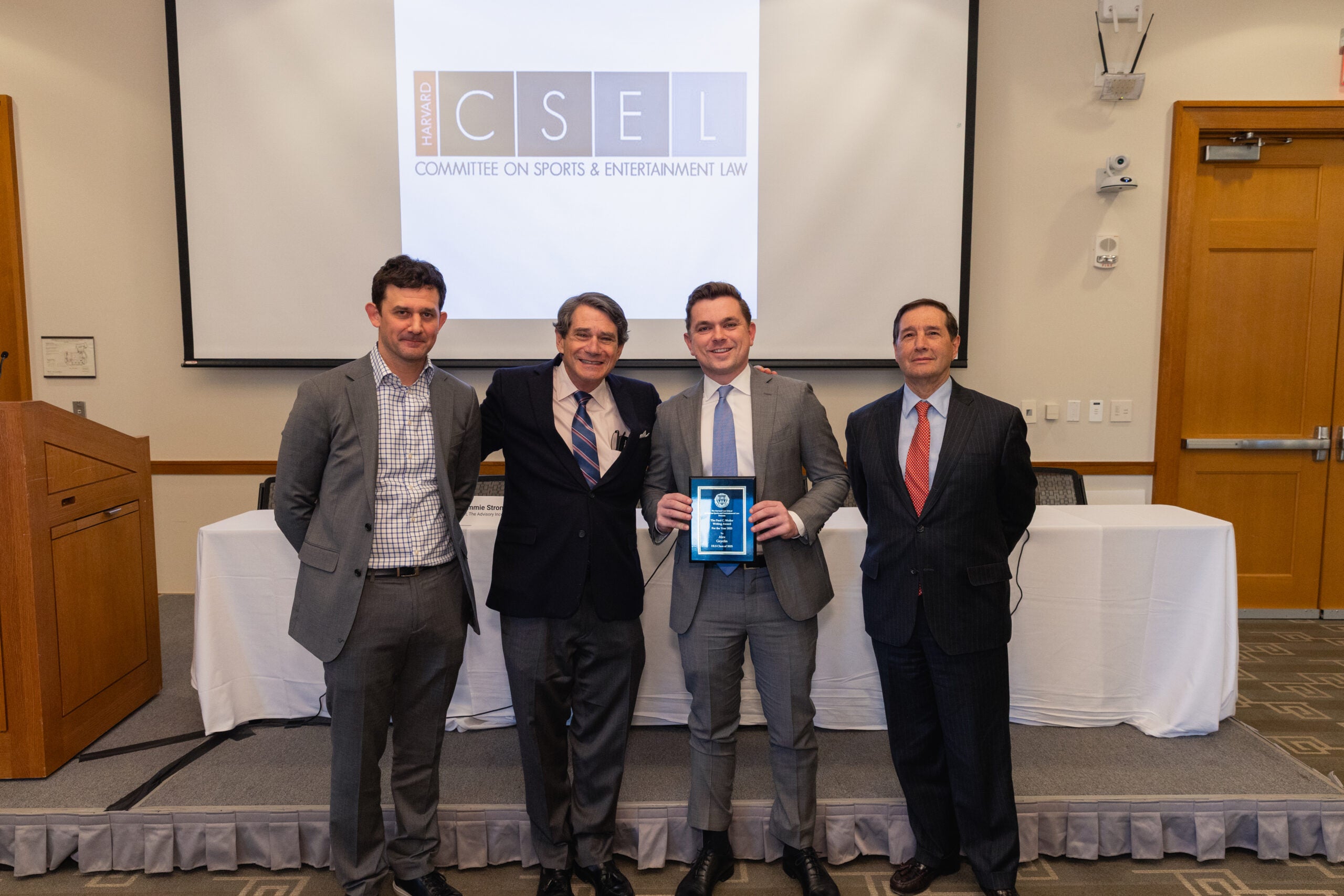
Office of Clinical and Pro Bono Programs (OCP): What sparked your interest in taking the Sports Law Clinic?
Alex Geyelin: I’ve always been a sports fan and have long wanted to work in or around sports in some capacity, so I was drawn to both of Professor Carfagna’s courses. From there, the clinic program provides a unique opportunity to get industry experience and work alongside practicing sports lawyers. I’m not aware of another law school that places students directly with teams, leagues, and agencies, so I’m super grateful HLS does.
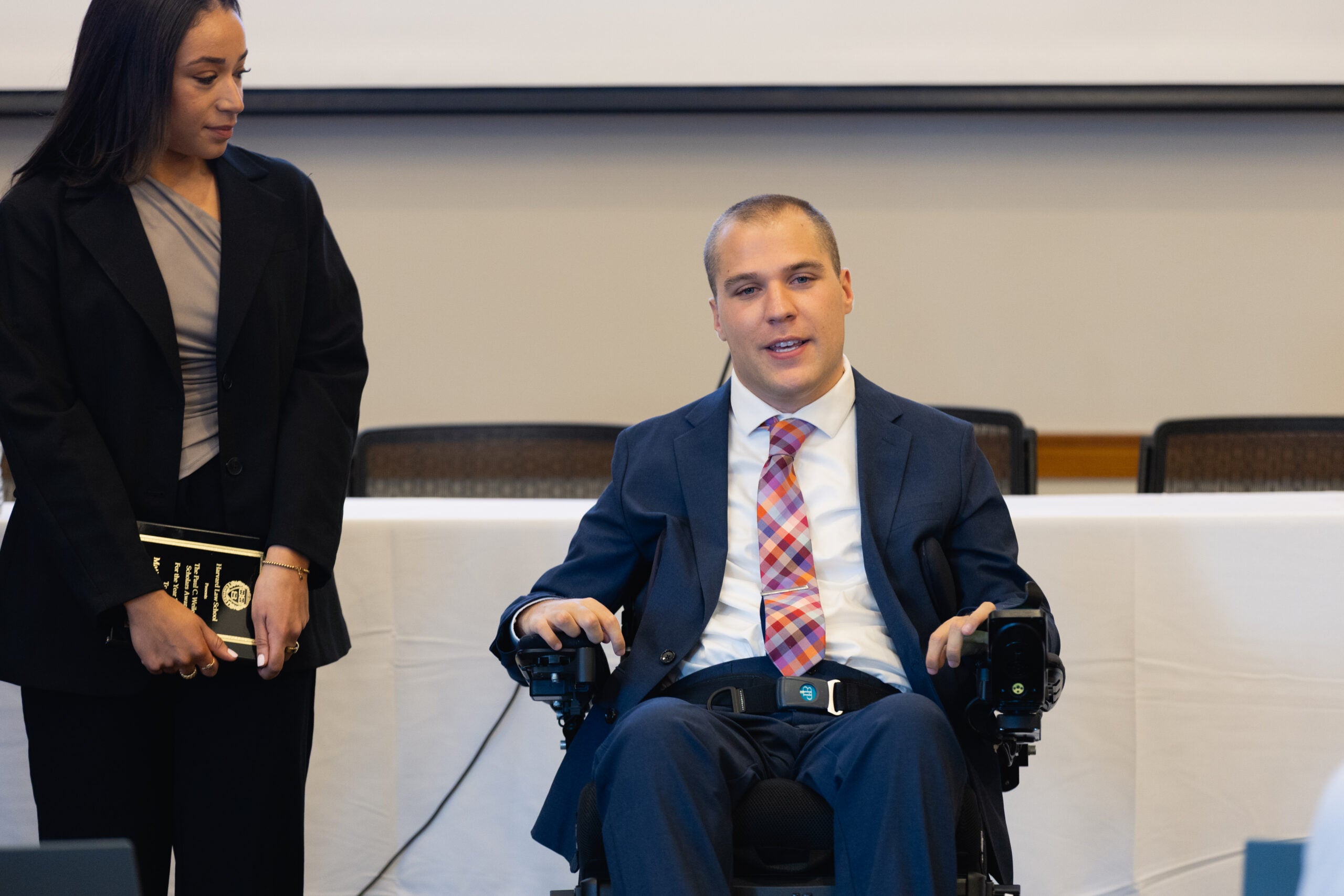
Ian Malesiewski: Growing up in Erie, Pennsylvania, sports have always been a huge part of my life. I started wrestling at the age of five and I have played pretty much every sport imaginable. My mom was also the first woman to swim 26 miles across Lake Erie.
In high school, I was one of the nation’s top-ranked wrestlers and football players. Unfortunately, I suffered a neck/spinal cord injury while wrestling at the United States world team trials during my junior year of high school. Despite this injury, sports have continued to shape who I am, and that lifelong passion ultimately led me to the Sports Law Clinic at HLS.
Michael Poirier: I came to law school with the goal of working in professional basketball, and the Sports Law Clinic was one of the key reasons I wanted to come to Harvard. No other school offers as robust a program to gain hands-on experience in the sports industry or features as many distinguished alumni in the field. I saw it as the perfect opportunity to combine my legal education with a lifelong passion.
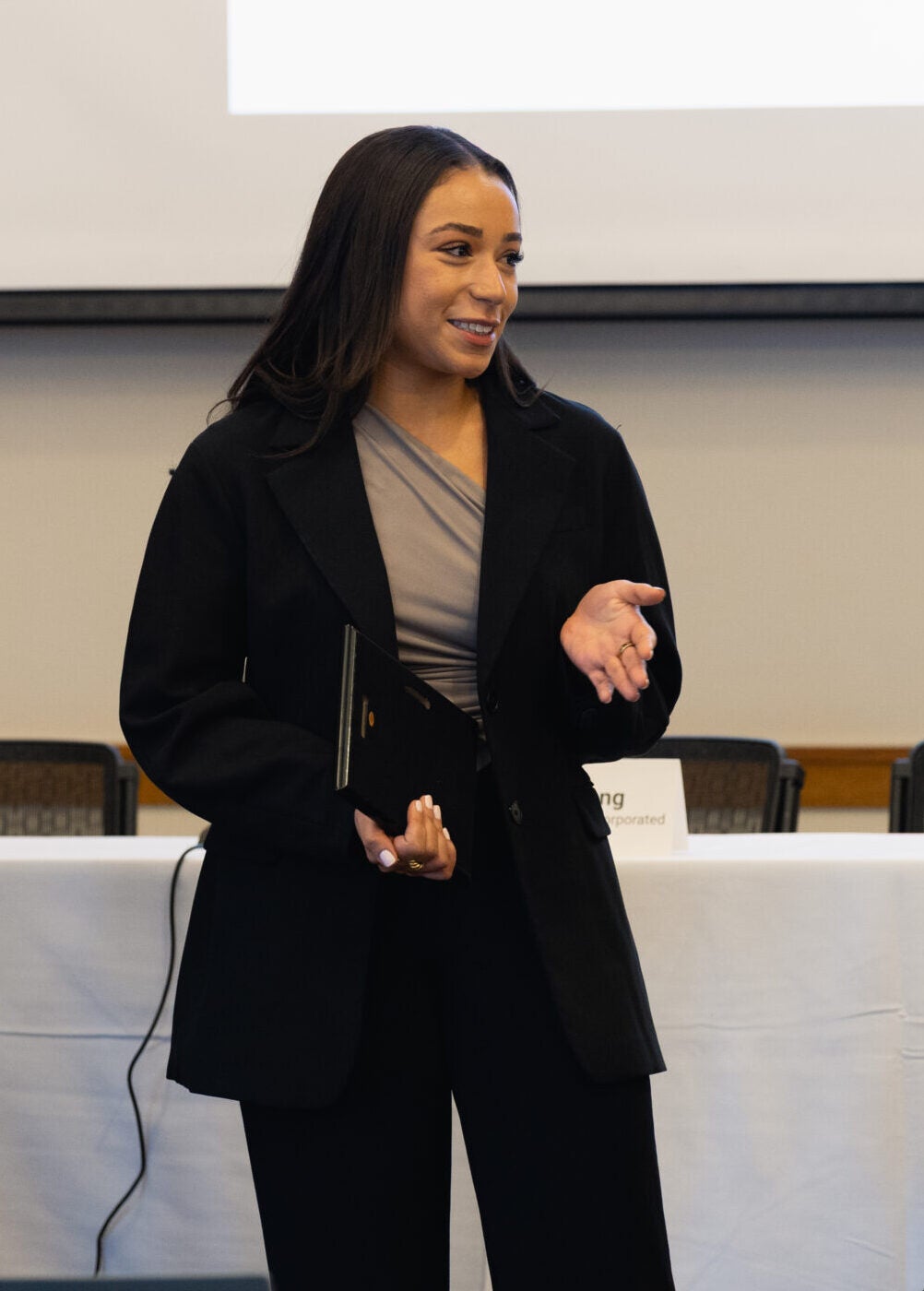
Matisse Rogers: Sports have always been a meaningful part of my life. I played competitive volleyball growing up and spent weekends watching my dad coach football. At the University of Michigan, my Saturdays were often spent in the “Big House,” deepening my appreciation for the cultural and commercial impact of sports.
When I arrived at HLS, I was encouraged to take Professor Carfagna’s sports law classes and to eventually join the Sports Law Clinic. As a soon-to-be transactional attorney, I knew that his Advanced Contract Drafting course was considered essential – and with two of his classes behind me and a passion for sports, enrolling in the clinic felt like a natural next step.
OCP: Where have your clinical placement(s) through the Sports Law Clinic been? What type of work did you during your externship(s), and what did you enjoy about it?
Geyelin: I spent this past J-Term on-site with the Milwaukee Brewers and have continued remotely through this semester. The work has been incredibly varied. Prior to MLB’s opening day, there was a lot of work with analyzing and drafting sponsorship, services, and vendor agreements, while lately it’s shifted a bit more toward legal research on various issues. It’s been cool to see how a Major League team operates from the inside, and in January it was hard to beat going to work at the stadium every day.
I separately spent this semester finishing up the Independent Writing Project I began last fall under Professor Carfagna’s supervision, which looks at Ohio’s Art Modell Law and the ongoing dispute over the Cleveland Browns’ potential 2029 move. It was a really interesting process, and it was great to go a bit deeper into many of the issues we covered in the two classes.
Malesiewski: This winter, I had the opportunity to complete a clinic in South Florida with the Miami Dolphins and Hard Rock Stadium. Throughout this externship, I had the chance to work on a wide range of projects – from drafting sponsorship and services agreements, to amending influencer contracts, drafting city ordinances, and summarizing incident reports.
I also had the privilege of working alongside and learning from incredible attorneys like Myles Pistorius and Marc Weinroth. Being able to contribute to a top-tier legal team in the very city where I plan to build my career after graduation made this one of the most rewarding parts of my law school journey.
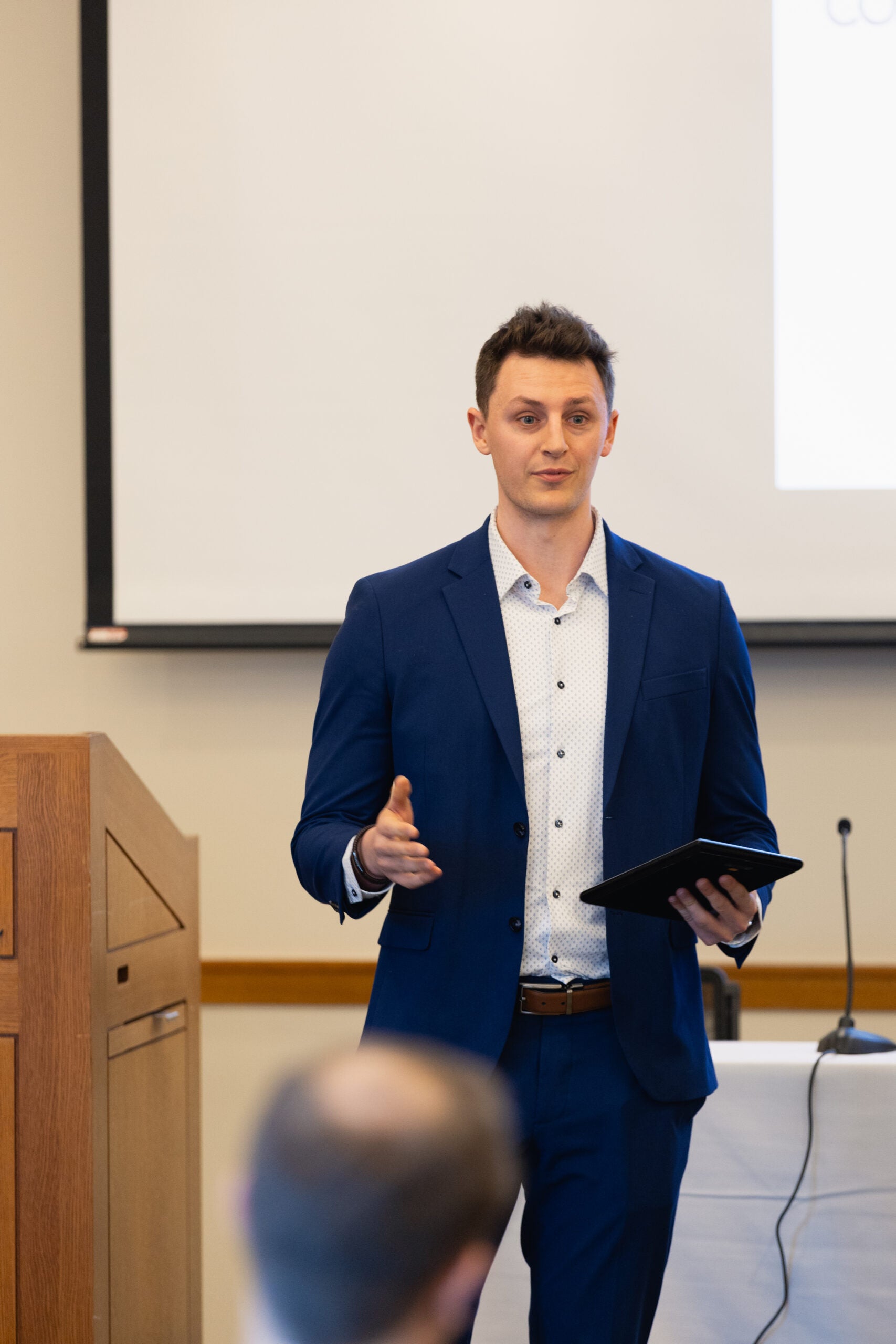
Poirier: My placement was with the Atlanta Hawks’ legal department, where I worked on a variety of legal research projects. One of my tasks was to analyze the Georgia Charitable Solicitations Act to determine whether the Hawks or their concessionaire needed to register as paid solicitors or fundraising counsel due to a sponsorship arrangement with the YMCA. That analysis required interpreting statutory definitions, comparing case law from other jurisdictions, and evaluating how those standards applied to real-world activities in the arena. This might not be that interesting to most people, but I thought it was neat to see my research play out in real time at the Hawks game later when a $0.50 YMCA donation was added to a water bottle I bought. It’s such a small detail I likely wouldn’t have noticed before. Experiences like that have made me view sporting events through much more of a legal lens.
I also got to play HORSE with the Hawks’ General Counsel, Scott Wilkinson, in the team’s practice facility and was one of the only interns to ever beat him in the last 20 years. He was a good sport about it.
Rogers: During my 2L year, I spent both January term and the spring semester working with the Milwaukee Brewers under Associate General Counsel Kellen Kasper ’10. I drafted and reviewed sponsorship and services agreements for the team and its minor league affiliate, the Wilson Mudcats, gaining hands-on transactional experience and learning the nuances of team-side dealmaking.
As a 3L, I returned to the clinic to work at NOCAP Sports, a startup operating in the collegiate name, image, and likeness (NIL) space. Under the mentorship of Co-Founder and Chief Compliance Officer Casey Floyd, I drafted influencer and athlete representation agreements, blending contract work with athlete advocacy during a pivotal moment in college sports. I loved the fast-paced, mission-driven environment, and the opportunity to work at the cutting edge of sports law.
OCP: What were your biggest takeaways from the experiential learning of the Sports Law Clinic?
Geyelin: A main takeaway has been the breadth of matters that in-house attorneys at sports franchises encounter. In Milwaukee I saw the Brewers’ legal team handle a wide range of issues covering all sorts of topics while working alongside the MLB office, local stadium authorities, minor league affiliates, corporate partners, and more. Kellen Kasper ’10, the Brewers’ Associate General Counsel and my direct supervisor there, has been great at making sure I’ve gotten to see as many facets of their work as possible. It’s also been interesting to see how the work changes seasonally, and how the legal team and other departments collaborate on ensuring agreements are both club-favorable and airtight.
Malesiewski: The Sports Law program at HLS does an outstanding job blending doctrinal learning with hands-on experience. Through courses with Professor Carfagna, I developed a strong foundation in sports law, which I was then able to apply in real-world settings through the Clinic. My externship with the Miami Dolphins offered an inside look at how an in-house sports legal department operates, and the types of issues it handles on a day-to-day basis. I was especially grateful to be placed with Hard Rock Stadium, a hub for major events like Formula One, the Miami Open, concerts, and of course, the Dolphins. It was the perfect setting to see how broad and dynamic the world of sports law can be.
Poirier: I came away from the clinic with a deeper appreciation for the complexity of sports law; it’s rarely black and white, and often requires balancing legal compliance, business interests, and public-facing considerations. The experience helped sharpen my attention to detail and my ability to think across multiple jurisdictions when precedent is scarce. Perhaps most importantly, though, it showed me that lawyers in sports shape more than just contracts—they shape fan experiences, community partnerships, and the reputations of teams themselves. Going to the games is a pretty cool perk too.
Rogers: Sports law can seem like an intimidating space, but one of my biggest takeaways is that you’re more prepared than you think – especially after taking one of Professor Carfagna’s classes. With the right mindset, these placements become incredible opportunities to learn by doing. The most rewarding experiences for me were the ones where I dove in, asking thoughtful and curious questions along the way. There are (many) more ways than one to have a career in sports law – learning what those avenues look like is the point of the clinic!
OCP: What does the Weiler Scholar Award mean to you?
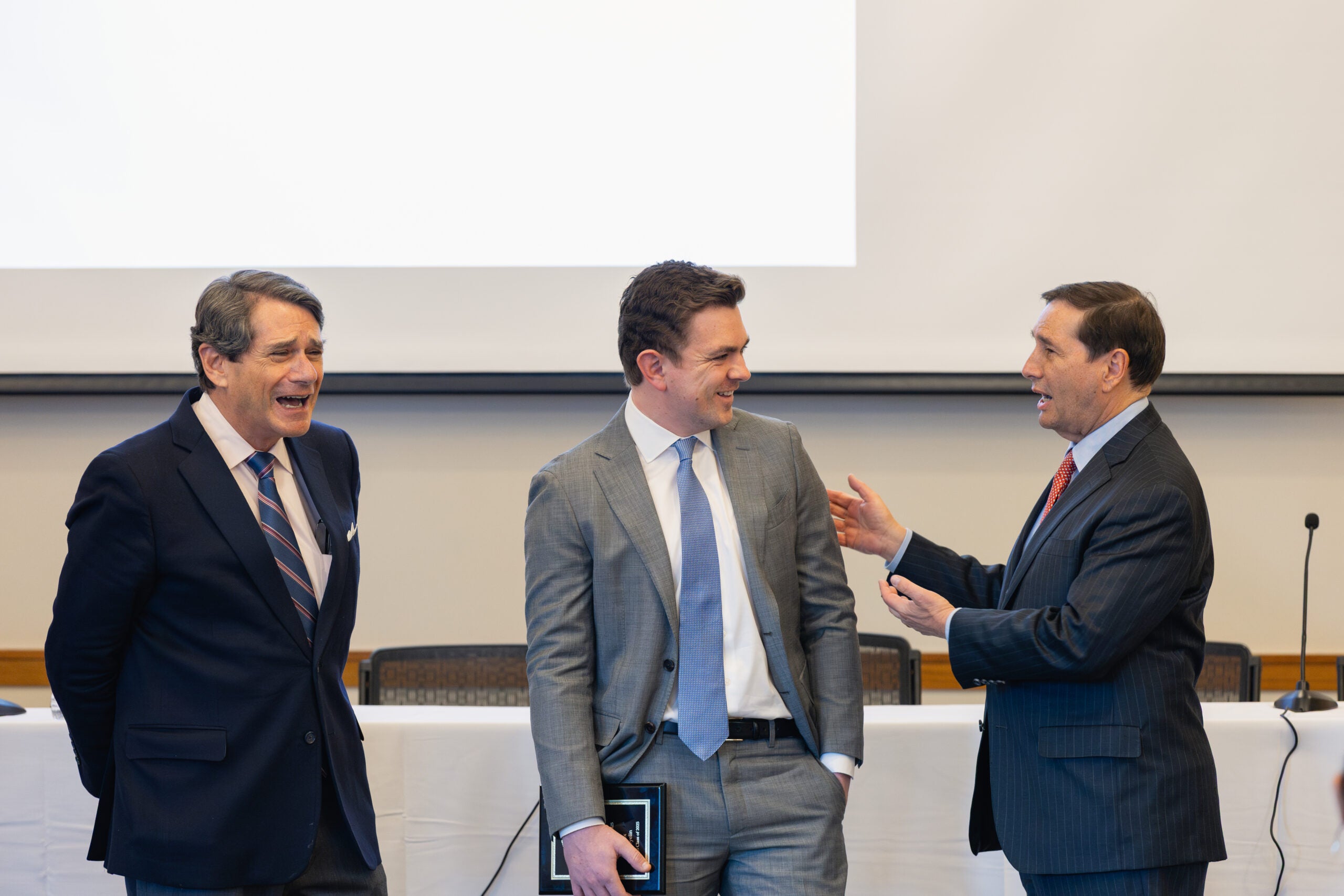
Geyelin: Receiving the Writing Prize means a ton. I’ve appreciated Professor Carfagna’s guidance and assistance throughout, and it’s been great to get feedback from the various other alums who are involved in the process. And more broadly, the sports program is one of the things that specifically excited me about coming here. Participating in it has been a highlight, so to have my project awarded the Weiler Prize is an honor.
Malesiewski: I’m incredibly honored to receive the Weiler Scholar Award. Although I never had the chance to meet Professor Weiler, I know how much he meant to the worlds of sports law and labor law, two areas I care deeply about.
Two of my favorite professors, Professor Carfagna and Professor Benjamin Sachs, have both spoken with deep admiration about Professor Weiler and the values he stood for. Their respect for him showed me the impact he had on the legal community and affirmed just how meaningful this award is. As I begin my legal career, I hope to carry forward Professor Weiler’s legacy by continuing to make a difference in sports law, and in the broader legal world, just as so many past recipients of this award have done.
Poirier: It’s an incredible honor and a reflection of the mentors, classmates, and friends who’ve shaped my experience here. It’s also a full-circle moment. I went to undergrad at Lakehead University in Thunder Bay, Ontario—the same place Professor Weiler was from—so receiving an award in his name carries a special resonance. The recognition from Professor Carfagna means a great deal as well. He’s played a huge role in helping students break into the sports industry, and I’ve learned a lot from working with him throughout law school. I hope to carry this momentum into my career after law school.
Rogers: Being named as a Weiler Scholar is an incredible honor. As the architect of sports law, Professor Weiler made the amazing sports law offerings at HLS – both the clinic and the courses – possible. I am deeply grateful to Professor Carfagna, Florrie Darwin, and Weiler Scholarship Fund donors for their support. The sports law program has been the most formative part of my HLS experience, and receiving this award is a moment I will carry with pride into my professional life.
Filed in: Clinical Spotlight
Tags: Class of 2025, Sports Law Clinic
